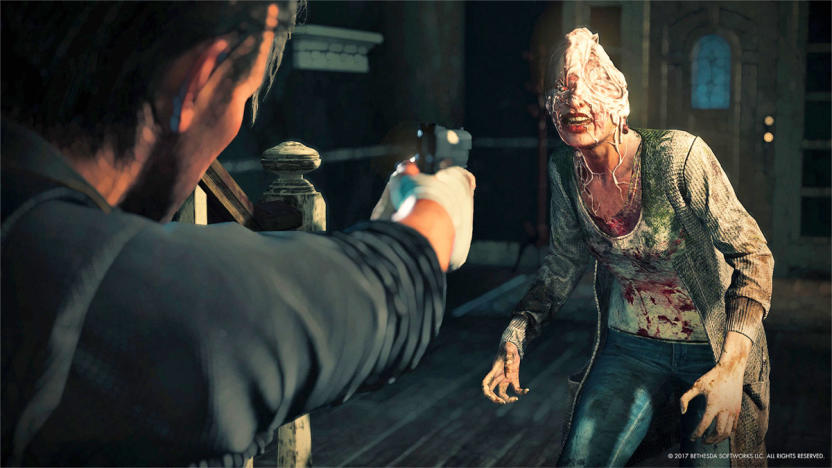reselling
Latest

Bethesda threatens lawsuit over sale of secondhand game
You can legally resell your personal games in the US under the First Sale Doctrine, which allows resales of copyrighted media like discs so long as you don't modify them in any substantial way. However, Bethesda doesn't think that applies if the shrink wrap is still present -- the publisher recently threatened to sue gamer Ryan Hupp for listing an unopened PS4 copy of The Evil Within 2 on Amazon Marketplace when he realized he didn't need that version of the game. As Hupp explained to Polygon, Bethesda's law firm viewed the listing as "unlawful" because he was not only unauthorized to resell new copies, but had rendered the game "materially different" by not including the original warranty.

Google goes after Pixel resellers by locking their accounts
Google has taken severe measures against Pixel buyers who violated its terms of service. Around 200 people purchased the phones via Project Fi and shipped them directly to a reseller in sales tax-free state New Hampshire, according to bargain-hunting site Dan's Deals. The phones were then resold to others, and the small profit split with the buyers. However, Google's terms dictate that buyers may not "commercially resell" any device and it locked their accounts, denying access to photos, emails and other personal data.

Lawsuit demands the right to resell Steam games
One of the biggest gripes about downloadable games (unless you're a developer) is that you can't typically resell them -- that title is yours forever, even if you'll never play it again. French consumer group UFC-Que Choisir is doing something about it, though. It's suing Valve to demand resales for Steam games. Its policy violates the European Union's right to resell legally purchased software, according to the group. As proof, it points to a 2012 Oracle case where a judge ruled that there was no difference between reselling disc-based copies and their downloaded equivalents.

Fast2Play hosting sales of Steam keys from Humble Bundles
Having a great Saturday where everything feels right in the world? Well uh, sorry, but we might derail that train of contentment. Game Informer reports that 7 Entertainment's online storefront Fast2Play and sister site Kinguin are hosting the sale of Steam keys purchased through Humble Bundles. Given that Humble Bundle patrons typically split their payment between the bundle's game developers, charities and the Humble Bundle staff, those groups would be cut from the profits made on resold keys. The Humble Bundle's terms also state that its licenses are not meant for commercial use, making the resale of keys obtained through Humble Bundles a violation of those terms. Ed Key, a developer of Proteus, told Game Informer that he was able to confirm Fast2Play's selling of Steam keys obtained from Humble Bundle purchases. Key discovered this by purchasing Proteus through Fast2Play, then comparing that Steam key to an inventory that had been sold through Humble Indie Bundle 8. Key has since succeeded in having Proteus removed from Fast2Play and some of its sister sites. Game Informer points out that Fast2Play is also hosting sales of Steam Gift versions of Awesomenauts and The Binding of Isaac. While that doesn't affect charitable proceeds, Steam Support states that "any accounts tied to a redeemed gift from a fraudulent source may be suspended." This possibility is noted in the "Activations Details" section of its Steam Gift sales, which asks customers to "please remember you are doing it at your own risk!" A 7 Entertainment representative has responded to the story, explaining that it was "never in our intention to expose any indie developer to any financial losses." The representative states that Fast2Play is an e-store with products from official suppliers, adding that it's awaiting an explanation from the distributor of the involved codes. The representative also described Kinguin as "an Ebay for gamers," explaining that Kinguin itself does not own those keys. [Image: Fast2Play]

EU clears resales of used software, shoots down Oracle's new-sales-only dreams
One advantage American technology fans can celebrate is the right to resell software. After the initial purchase, they're usually cleared to pass along any apps or games as long as the technology itself allows. Europeans haven't had that (legal) option to date, but the EU's Court of Justice has just ruled in a case against Oracle that they will going forward: no matter what the license says, those in EU countries can resell their downloaded apps as long as they don't try to keep a working copy for themselves. The new owner doesn't even have to shuffle over a local example and can go straight to the source. We can't imagine that Oracle and other companies averse to used software are jumping for joy, although copy protection and a lack of digital resale mechanisms might help them simmer down and let us treat our apps like we do our gadgets. [Image credit: Maciej Bliziński, Flickr]

Vonage to resell Covad DSL, call it Vonage Broadband
After a good bit of hand-shaking and check-writing to close out last year, Vonage has managed to remain out of the press for the majority of 2008. Now, however, the firm is sneaking back out from its cocoon in order to announce a partnership with Covad Communications. In essence, it seems that Vonage has inked an agreement to resell broadband packages using Covad's nationwide DSL network. Jeffrey Citron, Chairman, Chief Strategist, and Interim CEO even went so far as to say that the newly coined Vonage Broadband would enable the firm to "respond to the demand it hears from customers who prefer the Vonage brand." Really? You've got folks who prefer the Vonage brand? Maybe we missed the comeback.



